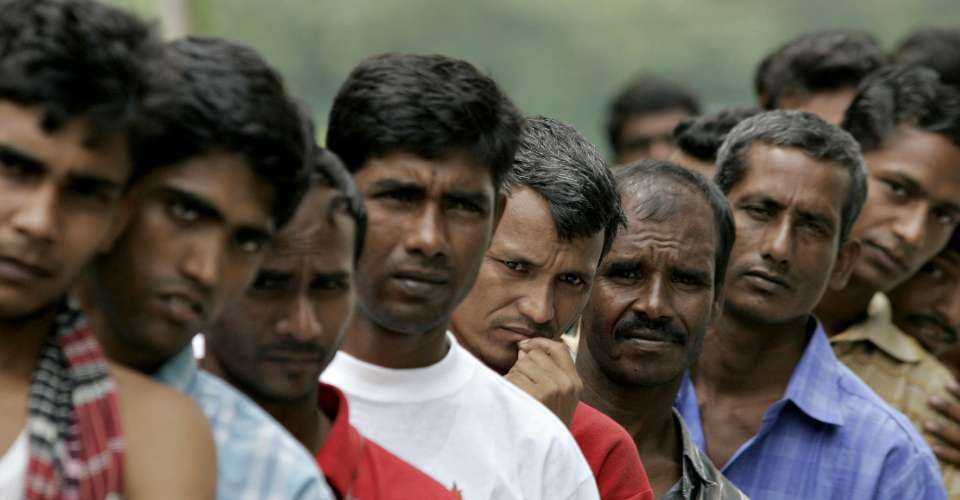
By Vanitha Nadaraj
Syndicates recruiting Bangladeshi workers in Malaysia are “beyond the control of the two governments,” the Malaysian High Commissioner to Bangladesh conceded last week.
Haznah Md Hashim was responding to a journalist’s query regarding a letter from the United Nations (UN) on the alleged fraudulent recruitment of Bangladeshi migrant workers through criminal networks.
The March 28 letter said UN experts had received reports that “certain high-level officials in both governments are involved in this business or condoning it.” It gave Malaysia 60 days to respond to the allegation.
The 60-day deadline is over and the Malaysian government is yet to respond. The Bangladeshi government reportedly received a similar letter which also has gone unanswered.
Both countries may pass over the UN’s letters, but they do it at their peril.
It is no secret that the migrant worker recruitment business is tainted with corrupt practices and high-level government officials are involved with layers of agents seeking to exploit the loopholes in the system.
The continued exploitation and victimization of migrant workers can pose a major challenge. Migrant labor makes up about 30 percent of Malaysia’s 14.5 million-strong workforce. It could be as high as 38 percent if undocumented workers are factored in.
Migrant workers from Indonesia, Bangladesh and Nepal make up about 77 percent of the total migrant labor force in Malaysia.
Bangladeshi workers heading to Malaysia are routinely misled and charged exorbitant recruitment fees of anything between US$4,500 and $6,000, which is the highest in the world. The recruitment fee for a Nepali worker is half of that.
The opaqueness in the recruitment process is obvious in the fee discrepancy, and in the disregard of an MoU signed between Bangladesh and Malaysia in December 2021, one of the many signed by both countries since the first one in 1992.
The 2021 MoU says that a Bangladeshi who wants to work in Malaysia needs to spend no more than 78,990 taka (about $675). The fees include payment for a passport, health check-up, registration, insurance, clothing, and recruitment agency fees. Malaysian employers are supposed to pay for the flight ticket and visa.
A recent study says 96 percent of migrant workers heading to Malaysia had taken at least one loan to cover recruitment fees. About 82 percent of these workers had taken two or more loans.
If they are lucky, they have a job paying $320 monthly, waiting for them on the Malaysian side, albeit one that constitutes long hours, poor medical care, and other forms of exploitation, with squalid living conditions.
If they are not, then they will arrive at Kuala Lumpur International Airport with non-existent jobs that can lead to a myriad of issues like overstaying, risking arrest, detention, ill-treatment, and deportation.
The recent rush by tens of thousands of Bangladeshis to beat the May 31 deadline to enter Malaysia for work is the latest example of how the recruitment process is problematic and exploitative.
After this date was set as the cut-off date for Bangladeshi workers with approved work visas to reach Malaysia, the country saw a fourfold increase in arrivals of foreign workers in the days leading up to the deadline. There also was news of 30,000 or so stranded Malaysia-bound workers at Dhaka’s Hazrat Shahjalal International Airport.
The Bangladesh National Human Rights Commission has ordered an investigation, believing these workers to be victims of job scams who had been cheated of 1.5 billion taka.
Since December, there have been reports of thousands of Bangladeshi workers being lured into Malaysia with promises of lucrative jobs, only to find out upon arrival that they had been duped.
The government is limiting the foreign worker quota to 15 percent of the total workforce by 2025. It is hoped that Malaysia will finally wean itself from its over-reliance on cheap foreign labor.
In the 1980s, Malaysia was one of the fastest-growing economies in the world recording an unprecedented 8-9 percent annual growth rate but there was one problem. Its industrialization program got off to a flying start but there was not enough local manpower. It had jobs while nearby countries had workers and not enough jobs. This made Malaysia an attractive destination for migrant labor.
It still is, especially for Bangladeshi workers. Despite all the reports of exploitation and victimization, there are almost 330,000 documented Bangladeshi workers in Malaysia. The majority is in the construction sector, followed by manufacturing.
In 2023, Malaysia was Bangladesh’s second-largest overseas job market after Saudi Arabia. However, the Malaysian government recently announced a five-year plan starting in 2026 to significantly reduce the number of migrant workers.
One of the initiatives was for employers to hire Bangladeshi workers directly through online immigration visa applications, making the process cheaper and faster. This would also remove the agencies handling applications for Bangladeshi workers.
Also in the pipeline is a multi-tier levy system that will be imposed on companies depending on the number of migrant workers employed.
These and other plans are likely to hit a snag after the recent renewal of a service contract with an IT company that developed and operates the Foreign Workers Centralised Management System for the Malaysian Immigration Department.
This sole platform for visa applications from 15 different countries exporting labor to Malaysia is run by Bestinet Sdn Bhd, which is owned by Bangladeshi-born Malaysian Aminul Islam Abdul Nor. His company “has strong links to Malaysia’s top politicians and has long been a magnet for controversy,” said Singapore’sChannel News Asia.
In 2022, when Anwar Ibrahim was the opposition leader, he urged the then-prime minister to act on corruption allegations against Bestinet and one other company.
Bestinet faced allegations of duping Nepali workers coming to Malaysia between 2013 and 2018, and it was declared susceptible to manipulation, with instances of conflict of interest and breach of governance and control, in the 2022 Auditor-General’s Report.
